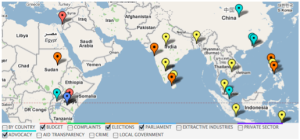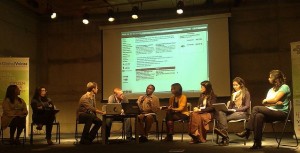Liveblogging Juliet Schor’s presentation “Using the Internet to ‘Save the Planet'” at the Berkman Center. Please excuse misrepresentation, misinterpretation, typos and general stupidity.
Sociology professor Juliet Schor is at the Berkman Center today to talk about how the sustainability community — both activists and practitioners — is increasingly using the Internet to “foster new lifestyles, consumption patterns and ways of producing.” Her presentation is based on her recent book Plenitude: The Economics of True Wealth, in which Schor argues that by shifting to a more sustainable way of life, we can improve both the environment and our economic situation. While writing the book, Schor says, she came to believe that the sustainability and technology communities should have a much closer relationship.
It sounds crazy — “post-industrial peasants” — but there are some very important features to that: diversity of activities and income streams is key. Putting all your eggs in the basket of one employer is riskier and riskier in times of economic uncertainty. The single income stream strategy is becoming less attractive, and diversification is smart. The reason it makes sense now in a way it wouldn’t have 50 years ago is because of technology. Technology allows a single individual or a small company to be productive in ways they couldn’t have before — access to the network, access to information. This is the next stage after “big.” The large economies of scale will be less important going forward, and small-scale efforts will become more important.
Schor starts out by describing a “dramatic collapse” in biodiversity since the 1970s, the growing ecological footprints of different countries (hint: the United States is at the top, using more than four times the world average biocapacity per person), and our collective failure to reduce global carbon dioxide omissions. (She points out that recent data shows that the best way to reduce emissions is to have economic collapse, though that’s not practical as a long-term strategy.)
Schor argues that a purely technological approach won’t halt climate change — this is also a problem of scale. According to a recent paper in Nature, we have already exceeded two of nine different “planetary boundaries” (in categories such as climate change, ocean acidification, biodiversity loss, and others), and we’re close to hitting the sustainable boundaries on a number of others. The strategy of de-materialization (reducing the “material intensity” of our energy use) has had some success, but our economic growth has “more than outweighed the decline” in material intensity. On a worldwide basis, Schor says, our material intensity has actually increased by around 45%, while North America has been a particularly egregious user of materials — our material extraction has increased by about 66% since 1980. This is largely due to our use of fossil fuels and the construction boom.
The Challenges
Schor argues that the world needs to cut its ecological impact rapidly. The problem, she says, is that we’re in the midst of an unemployment crisis. This is a disaster both economically and environmentally speaking. We also shouldn’t take any paths that worsen the distribution of wealth — there’s a negative correlation between income inequality and certain environmental indicators — or decrease human development (i.e., wealth and well-being) overall.
Plenitude: The Economic Model
Switching to green technology (a clean consumption and production system) will help, Schor says. So will improving eco-knowledge, which she defines as “open source transmission and ecological skill diffusion.” We’re “centuries behind” in terms of developing both an understanding of nature as a scarce resource and technology that would allow us to increase the productivity of that resource.
Schor points to working hours, which have declined dramatically between 1870 and the 1970s (from around 3000 to around 2000 per year). Since 1973, however, the annual hours worked have been increasing the United States. A country’s ecological footprint rises with its average annual hours worked, even when income is held constant. Schor says that as we move forward, we need to focus on increasing productivity growth in fewer working hours, rather than by adding new hours. She wants to move hours from the “business as usual” economy to “self-providing” and green entrepreneurship. This will reduce market dependence and reliance on large corporations and provide more time for people to increase their skills, build local resilience, and help create a small-scale, low-impact sector of enterprises.
Schor provides an example in the form of permaculture (a high-productivity approach to agriculture) and urban agriculture. This form of micro-generation, which applies not only to farmers’ markets and fruits and vegetables but also to energy and homes (DIY yurts, anyone?), is low-cash and low-footprint in comparison to more market-driven methods and mechanisms. Schor is currently working on a number of other case studies, including a permaculture farm in the Netherlands, a converted soybean farm in Kansas build with fab lab technology. This farm is also trying to build a blueprint for other communities to follow. What’s cool about this, Schor says, is the low financial barriers to entry: communities can purchase the machines and the costs of materials are low.
Schor’s also interested in the principle of sharing: couches, homes, cars, tools, etc. She says the recession has “changed the calculus of time and money,” creating an environment that fosters these sorts of sharing schemes. Another initiative that has sprung up in this environment is the transition movement, which focuses on helping communities build local resilience.
Overall, Schor says, our constraint is much more about time — we work long hours in formal jobs, which we need in order to have access to health insurance, housing, and education. We need to find ways to allow people to “delink” from these jobs, which are high footprint jobs, to allow them to do more of this kind of small-scale activity.


